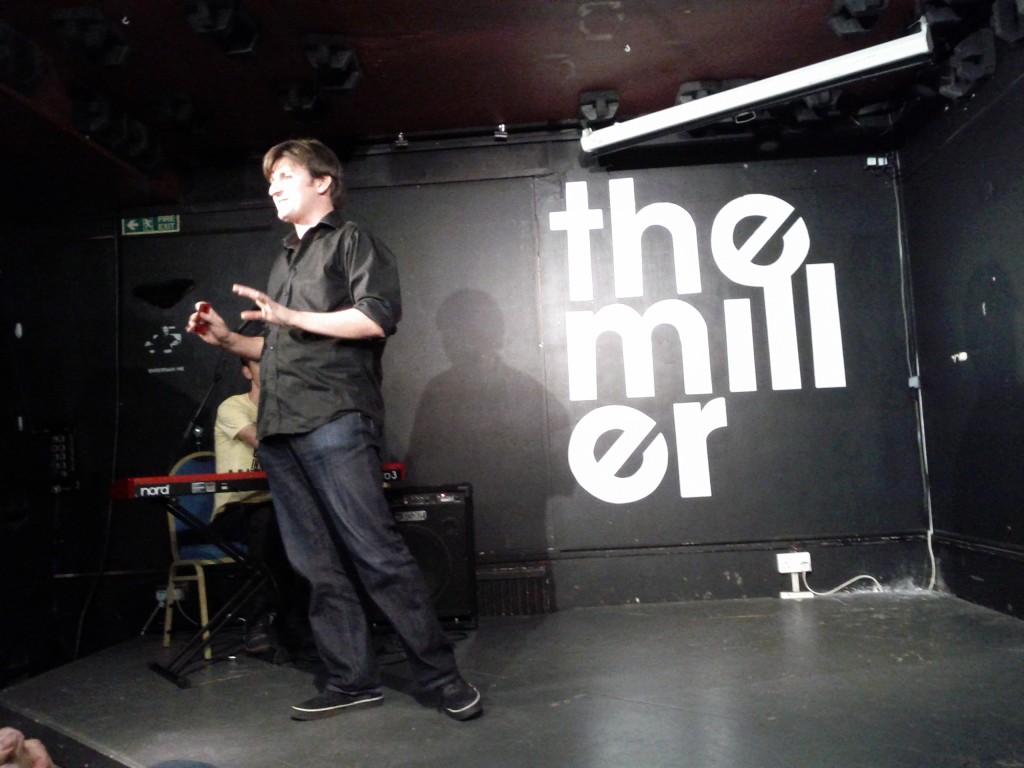Improv (when I’m loving it) is the most minimalist art form.
Improv tends to be better when we bring only a little bit of ourselves to it; when we plan as little in advance as possible. The best, most honest, improv moments are when you stare across the empty void space of the stage into the mutual nothingness of another improvisor doing the same and something from nowhere/somewhere bubbles up and you begin working with it.
We call interesting on-stage accidents “gifts” because they add information and colour that nobody expected or forced onto the art.
Handles/Games and props and theatresports can be fun and stuff, but I find them frustrating because they impose an a priori structure or idea on the scene, even just accidentally.
Case in point, I just got back from seeing a show (in London!) with 2 guys on stage and one music guy on keys on the edge of the stage. It was a cool set, with the performer’s hosting personas blurring into their scene personas, with tangential, sudden transitions between scenes sharing only a common line or idea. The music guy was quite good (he played a little as people came in), even though I feel like he played a little too much during the scenes. I’m not interested in going on and criticizing this show. However, many of these scenes became about the music. Music can be a good accompaniment, or on equal footing with the players in any show. However, some action in the show came to be that way because the idea/feeling expressed by the music guy came in the form of music. At one point, an argument was breaking out between the players, and duly the music increased in intensity as well. The music guy was fantastic in expressing the mood of the scene (in parallel to us choosing to observe the scene on stage, slightly redundant). But because music, as a form of expression, is naturally rhythmic, the arguing actors began dancing. Completely, inorganically, de-railing the interestingness of the argument. Laughs from the audience at the absurdity of an argument turning into a dance. This happened a few times throughout the show, where the improvisors would implicitly or explicitly respond to the music-ness of the music in a fourth-wall-savvy “isn’t this crazy?” way.
I think the problem is that the form of augmentation to the natural minimalism of improv is overwhelming the normal organic generation of ideas, killing the show.
This is why I don’t like props or pre-themed shows, or anything with too much structure. I’m working on a system to augment improv, and I’m trying to do it in a way that lets improvisors express their bubbling ideas better, or in a more interesting way than before, without over-powering the process.
Perhaps the problem is novelty factor. When a thing is new to the players or the audience, the natural take-everything-insanely-seriously part of the improv will latch onto it and deconstruct it. This leaves us with a husk of a show that isn’t about anything other than the implicit and explicit choices about the structure of the improv made by the augmentation designer (i.e. me).
Let’s say I design a system that constantly records the show and lets players bring back old scenes, projected on the stage, and make direct references to them, place them out of content, or reinterpret them.
A good set of improvisors, when first confronted with this system, will use the tools at hand. You’ll see a show about regret, or misinterpretation of memory, or generational repetition, or people re-writing their version of past events, or how you’re in love with your doppelganger, or how you’re fond of the past.
If you have a hammer, then everything looks like a fucking nail. Tell a friend to do an interpretive dance about how they feel today. Tell another friend to do the same, but give them a hammer to hold and I guarantee you the second dance is going to be angrier and some more shit is going to get smashed.
I admire traditional creative tools like the paintbrush or the pencil. They have their pre-imposed difference (“flowy stuff” vs. “sketchy stuff”), but when you pick up a paintbrush or a pencil, usually the first thing you are compelled to make isn’t a work of art that is about painting or sketching.
I want to make a tool that affords new things, but I also want its implications to disappear into the background. It’s kind of hard to compete with the status quo tool, which is “nothing”. So, I’m working hard on the improv paintbrush.
Hopefully, fans, you’ll get to see the results of this pondering some time in June/July.
